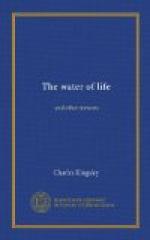To the world’s end, a church of some kind or other will be the centre and symbol of every civilization which is worthy of the name; of every civilization which signifies, not merely that men live in somewhat better houses, travel rather faster by railway, and read a few more books (which is the popular meaning of civilization), but which means—as it meant among the Greeks, the Romans, the Jews, the Christians, among those who discovered the idea and the very words which express it—that each and every truly civilized man is a civis, a citizen, the conscious and obedient member of a corporate body which he did not make, but which (in as far as he is not a savage) has made him.
How far from this idea are the great masses of our really wealthy and well-to-do Londoners? How much is it needed, that wise men should try to re-awaken in them the sense of corporate life, and literally civilize them once more!
Consider the case, not of the average wretched, but of the average comfortable man. The small shopkeeper, the workman, skilled or unskilled—how small a consciousness has he of citizenship. What few incentives to regard civism as a solemn duty. For consider, of what is he a member?
He is a member of a family; and, in general, he fulfils his family duties well.
Yes, thank God, the family life of Englishmen is sound. The hearts of the children do not need to be turned to their fathers, or the hearts of the fathers to the children, as they did in Judea of old. Family life, which is the foundation of all national life—nay, of all Christian and church life—is, on the whole, sound. And having that foundation we can build on it safely and well, if we be wise.
But of what else is the average Londoner a member? Of a benefit-club, of a trades’ union, of a volunteer corps. Each will be a valuable element of education, for it will teach him that self-government, which is the school of all freedom, of all loyalty, of all true civilization.
Or he may be a member of some Nonconformist sect. That, too, will be a valuable element, for it will teach him the solemn fact of his own personality; his direct responsibility to God for his own soul.
And I cannot pass this point of my sermon without expressing my sense of the great work which the Dissenting sects have done, and are doing, for this land (with which the Bishop of London’s plan will in no wise interfere), in teaching this one thing, which the Church of England, while trying to carry out her far deeper and higher conception of organization, has often forgotten; that, after all, and before all, and throughout all, each man stands alone, face to face with Almighty God. This idea has helped to give the middle classes of England an independence, a strong, vigorous, sharp-cut personality, which is an invaluable wealth to the nation. God forbid that we should try to weaken it, even for reasons which may seem to some devout and orthodox.




